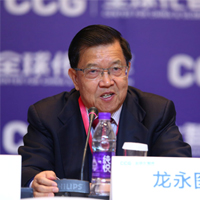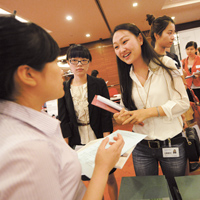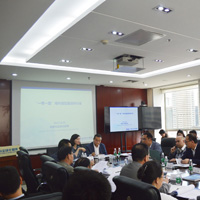- 当前位置:
- 首页>
- 活动>
- ���������������
���������������
CCG持续关注国际关系议题,推动中国与全球化的发展,积极开展国际交流,充分发挥智库“二轨外交”作用,在巴黎和平论坛、达沃斯世界经济论坛、慕尼黑安全会议等重要国际政策与意见交流平台上组织分论坛、边会、圆桌会议、晚宴等活动,促进国际政商学界对话,凝聚共识;CCG积极与各国政界、智库界、工商界开展“二轨外交”活动,每年常态化赴多国调研与交流,促进中外关系攸关方互动,保持与多国政策圈层的沟通渠道。
-

【China Daily】China’s experience in dealing with globalization recommendable
Long Yongtu, Chairman of the Center for China and Globalization (CCG)and former vice minister Ministry of Foreign Trade and Economic Cooperation./ Photo provided to chinadaily.com.cnToday’s economic globalization is driven more by the internet than technology and it’s materialized increasingly by small and medium enterprises than multinational companies and more about the extension of value chain than the relocation of industries, Long Yongtu, former deputy minister of commerce and former Secretary-General of Boao Forum for Asia, concluded at the 3rd China and Globalization Roundtable Forum in Beijing host by a leading think tank, the Center for China and Globalization(CCG) . The following is an excerpt from his speech:The setbacks and challenges especially in US and Europe now the globalization faces are per se the embodiment of the unbalanced redistribution which governments of the all levels in the world should take responsible for.Most Chinese now recognize the positive role of the globalization which indicates the success of the Chinese government in deal with the benefit-sharing. In other words, the experience China got could be recommended to other countries given the current anti-globalization trend worldwide.The benefits globalization should be enjoyed by different social strata and social equity is also a vital attribute in sustaining globalization.The Chinese government has made social equity a priority by carrying out targeted poverty alleviation, narrowing regional gap and improving income redistribution. The recently unveiled Xiongan New Area, a strategy aimed at boosting regional development, is a prime example of this.Not withstanding, it is too early to say that China should lead globalization considering the shortcomings both on science and technology and enterprise competitiveness. China has still a long way to go for such a position.From China Daily, 2017-4-24
2017年5月2日 -
张蕴岭:共赢发展 “一带一路”为世界提供另一种选择
专家简介张蕴岭,中国与全球化智库(CCG)学术委员会专家,中国社会科学院学部委员。 央视网消息(记者 李祎男)4月27日,中国记协在北京举办第106期新闻茶座,中国社会科学院学部委员、国际研究学部主任张蕴岭以“一带一路”建设的新阶段为主题与中外记者和驻华使馆新闻官进行交流,中国记协书记处书记王冬梅主持此次新闻茶座。 习近平主席提出“一带一路”倡议提出三年多来,与之相关的消息越来越多地出现在在人们的视野中。张蕴岭表示,一带一路不但是十三五规划中的重要内容,现在也已成为我国领导人出访时的必谈话题。“一带一路倡议在全球声望越来越大,联合国和诸多国际性机构也对倡议非常重视”,他表示,“一带一路”国际合作高峰论坛即将与5月中旬在北京举行,各个相关国家将在此次论坛中将进一步达成共识,签订更多的合作项目。 倡议为中国发展提供新思路 张蕴岭说,中国经济高速增长期已经结束,目前进入中高速增长阶段,因此,中国的经济模式必须转型。与规模相对较小的经济体相比,中国产业规模大,接替难度大,转型不能走别国的老路,必须另谋一条符合中国国情的新路。他说,一带一路强调“共商、共建、共享”的新模式,不但对中国有利,对于相关国家而言也是加速发展的机遇与平台,因此,倡议提出伊始便受到俄罗斯以及中东欧各国等很多国家的欢迎。 “一带一路”倡议连接了东亚、欧洲、非洲等地,在为沿线与相关国家提供发展机遇的同时,也给中国提供了新的发展空间。改革开放多年令我们意识到,单纯的开放不能解决所有问题,投资通常只去往最好的地方,由此造成的区域发展不平衡,收入分配不平衡的问题需要通过新思路与新方法来解决。 “一带一路”倡议通过国际化的视野与合作共赢的理念为中国发展带来新的动力。张蕴岭认为,一带一路建设不但有助于为中国提供就业机会,还可以有效解决中国国内地区发展不平衡等问题,并为中国企业“走出去”创造了机会,“让中国企业也搭上了别国的发展快车”,无疑是推动中国发展的百年大计。 倡议促进区域共同繁荣 张蕴岭指出,“一带一路”倡议以改善当地基础设施建设等方面为出发点,与合作国家共商、共享、共建,并与当地的发展计划有效对接。 “‘一带一路’着重产能合作而非产业转移,这种合作不但加速当地发展,还可以有效培育当地自身发展能力。的从而真正实现共同繁荣。”张蕴岭强调,中国与他国在当地合作建厂,不但建设质量高,生产出来的产品质量也高,中国公司在设备制造、工程承包、架桥修路等方面的优势在当地“打得开、做得成”,给相关国家提供了发展空间,也促进了当地发展计划的顺利实施。 一带一路建设采用了政府与社会资本合作(PPP)的模式,并建立了诸如亚投行等国际性机构,为现有金融体系提供补充,确保在建设过程中让参与工程的企业盈利,从而调动各方积极性。 “中国不走强则必霸的发展道路”,张蕴岭指出,与世界上很多国家发展道路不同的是,中国奉行和平与共赢的发展理念,用一带一路的新方式为自身与世界发展作出新贡献。 他说,西方国家自从工业化以来,越是靠海的国家和地区发展就越快,而内陆城市发展就相对缓慢。中国通过一带一路建设,可以推进相关国家陆上交通的发展完善,高铁、高速公路可能在未来成为最便捷有效的交通与运输方式,再由政府推动相关国家间签订“运输便利化协议”,建立起高铁网络,可以极大推动内陆城市的发展水平,从而建立新的地区、世界秩序,重构地缘优势,使欧亚大陆联结发展,使相关各国成为具有相同利益的命运共同体。 “共赢发展取代战争与博弈,这是中国作为新型大国的发展道路。” 一带一路论坛凝聚合作共识 作为参与“一带一路”构想初期讨论的专家之一,张蕴岭认为,未来由一带一路带来的经济增长,将占到整个世界经济增长的85%左右。一带一路方案为世界提供了另一种选择,一种不依靠西方大国也能成功的方案,而一带一路国际合作高峰论坛将是“一带一路”倡议落实过程中的重要一步。 张蕴岭表示,下个月即将在北京举办的“一带一路”国际合作高峰论坛可以有效凝聚共识,推动合作,使“一带一路”倡议的继续完善,继续创新。“志同道合者先行”,张蕴岭表示,目前对“一带一路”倡议还处于观望甚至不信任的国家可以通过此次峰会更好的了解倡议内容,了解中国推动国家间发展的新思路,从而推动新合作机制的建设,这也将有助与全球化进入新的发展阶段。文章选自央视网,2017年4月29日
2017年5月2日 -

【China Daily】Battle for the brightest
An applicant (left) introduces himself to a representative from University of International Business and Economics in Beijing during an overseas job fairs targeting overseas Chinese talents in New York. [Photo/Xinhua]Competition among domestic universities to attract talented young faculty members is heating up, Zhao Xinying reportsThe "generosity" a prestigious university exhibited in a recent recruiting notice to attract prospective talented young employees has caught people’s attention.In the notice, the University of Science and Technology of China, located in Hefei, East China’s Anhui province, said top science and engineering talents are wanted for crucial teaching and research posts.Those hired will receive a salary of at least 450, 000 yuan ($65,000), research funds ranging from 1 million to 3 million yuan, a living stipend of 500,000 yuan and a 160-square-meter apartment.Applicants are expected to be aged below 40, have generated outstanding research results and have worked more than three years at a prominent higher education institution or research institute overseas.The university is not alone in seeking young talents, though its offer is particularly generous. In recent years, an increasing number of universities in China have adopted such methods to lure young talents studying or working overseas.Some, like the university in Hefei, post want ads with tempting incentives while others send recruiting "task forces" overseas in the hope they will be able to sweet-talk talents into signing up.Tian Guoqiang, director of the School of Economics at Shanghai University of Finance and Economics, said his university was one of the earliest among higher education institutions in China to start recruiting faculty members from overseas.Since 2005, Tian has led a team to the United States each year to look for teaching and research staff. More than 100 teachers and researchers with PhDs have been sourced in this way over the past 13 years.Liang Qi, director of the human resources division at Shanghai Jiao Tong University, a leading domestic institution, said almost every visit made by the heads of the university and its schools to institutions overseas has involved recruiting presentations and interviews with talented young people.And not long ago, the university published want ads in leading international periodicals, such as Science, and Nature, for people who are dedicated to relevant academic research.National importanceIn January, Tian and his colleagues flew to Chicago for the Allied Social Sciences Associations Annual Meeting, where thousands of the best minds in the social sciences gathered to present and celebrate new research achievements.On the sidelines of the annual meeting, Tian’s team interviewed 82 candidates who stood out from 261 applicants, many of whom graduated from the most prestigious universities in the US, including Princeton, Stanford and Columbia.Twelve were eventually hired.Tian said the importance of such talents cannot be overstated, not only for the development of a university and a particular discipline, but also the county.The professor of economics said business education at domestic higher education institutions, for example, was brought back on track in 1990s, when China set the goal of building up a market economy and joining the World Trade Organization.But although almost all domestic colleges and universities have introduced majors related to business studies during the past two decades, there is still a short supply of internationally educated teachers who are able to lecture on courses that meet international criteria, which hinders domestic business schools from moving forward."Many institutions solve the problem by extending invitations to talented young Chinese studying or working abroad," Tian said.Liang at Shanghai Jiao Tong University said recruiting talented staff is the "top priority among all priorities", since all the best universities in China, including his, are making great efforts to become world-class institutions."We treat the young members of our faculty as our strategic resource, as they are playing a key role in the development of the university," he said.More coming backWhile domestic universities are constantly heading overseas to hunt for bright minds, an increasing number of talented young people are returning of their own volition.Statistics from the Ministry of Human Resources and Social Security show that a total of 2.65 million Chinese have studied overseas since China’s reform and opening-up in 1978, with more than 430,000 of them returning home last year alone.With the stimulus and support of a series of national-level plans to attract top talents, such as the Recruitment Program of Global Experts launched in 2008 and the Young Overseas High-level Talents Introduction Plan initiated in 2011, the number of people coming back with the title of professor between 2008 and 2016 was 20 times more than the total number who returned in the three decades between 1978 and 2008.Wang Huiyao, director of the Center for China and Globalization (CCG), a think tank, has conducted research on talent-related topics for years.In his eyes, many Chinese talents choose to come back because of the great potential for both career and personal development being released by the rapid rise of China."New things are occurring in China all the time, creating a lot of opportunities and attracting attention from all over the world," he said, citing the recent announcement of the plan to develop the Xiongan New Area in Hebei province as an example.After earning a PhD from Netherland’s prestigious Tinbergen Institute and Erasmus University Rotterdam last year, Huang Zhenxing chose to join a university in his hometown Shanghai, rather than a post at a university in the US or Australia.The 32-year-old associate professor of economics at Shanghai University of Finance and Economics believes that although China’s economy has grown to be the world’s second largest, there is a lot to be improved in business research and education, and he anticipates career take-off and a brighter future.Although China’s research in economics is not as advanced as it is in some other countries, Huang said he has strong confidence that China will catch up soon."Many bright people of my generation have studied abroad and have now come back. These people know China’s reality and international research approaches and can combine them together, making me believe that China’s catching up is merely a matter of time."Good conditionsIn spite of the fact more talented individuals are coming back, Tian said the competition among domestic institutions for high-end returning talents is becoming increasingly fierce."At the annual meeting in January, we encountered at least 40 domestic institutions which were also conducting job interviews there," he said. "You could not imagine such a situation a decade ago when the number was only a single digit," he said.He added that many universities, particularly some with the financial support of the provincial government where they are located, offer very high, attractive salaries to overseas talents.But he believes that a high salary is not the be-all and end-all for attracting talents."Rather, ’soft power’ elements such as favorable working conditions, a comfortable living environment, as well as a clear self-development route are more important," he said.From his decade-long recruiting experience overseas, Tian said the biggest concern among high-end talents when deciding whether to return and work in China is whether they will enjoy personal growth.His university has therefore built up an academic platform by regularly holding seminars, workshops, lectures, forums and conferences that involve global academics to ensure that teaching and research staff at the university remain close to the frontiers of their disciplines.He said the university has also established a "tenure track" system-a system similar to academic tenure overseas-that offers high salaries and abundant support for research over six years.Annual evaluations over the six years, along with a final evaluation at the end of that period, then determine whether the professors will be offered tenure or leave the position.Wang of the Center for China and Globalization said it is always a big choice for high-end talents to relocate, particularly those who have lived and worked overseas for quite a long period of time, as there are so many things to consider, so many things to adapt to and so many problems to be solved."In that sense, domestic employers offering all-rounded support and services-internationally competitive salaries, academic freedom, career development, convenience in daily life, spouse’s employment, children’s education and so on-would be the most attractive."From China Daily, 2017-5-1
2017年5月2日 -

【China Daily】Green card to become smart ID with chip
Foreign permanent residents in China will have their "green cards" upgraded starting in July, which may make their daily life and work easier in the country, according to a reform plan issued by the Ministry of Public Security on Monday.The existing permanent resident’s permit, known as the Chinese green card, will be replaced by the Foreign Permanent Residence Identity Card.Similar to the second generation of ID cards for Chinese citizens, the machine-readable smart card will contain a chip in which the foreigner’s identity information is kept, and the information will be shared by railways, airlines, hotels and banks, according to the plan. The card also has anti-counterfeiting features, officials said."We’re working closely with relevant departments to do the technical preparation so that the new cards can be smoothly used in the above mentioned sectors," said Wang Yugang, an officer with the ministry’s Exit and Entry Administration Bureau.All the preparation work will be completed before the end of June, and green card holders can then go to local public security agencies to replace their cards. If they choose not to exchange them for the new card, the existing cards are still valid until the expiration date, according to the ministry."We hope the new card gives foreign permanent residents a sense of belonging in China," Wang said.China began to issue permanent residency permits in 2004. However, over the years, getting a Chinese green card has been difficult due to the high requirements. Ministry figures show that from 2004 to 2013, only 7,356 foreigners were granted the status.Since September 2015, governments in China have gradually eased the residency and entry policies for foreigners, which has helped attract more talent from overseas to invest or open businesses and boosted international exchanges in China.In 2016 alone, 1,576 foreigners became permanent residents in China, up by 163 percent year-on-year, according to the ministry.However, green card holders have for long complained that the card is more like a long-term visa instead of facilitating their daily lives.In February, the Central Leading Group for Deepening Overall Reform, led by President Xi Jinping, approved a plan that calls for further reform of the permanent residency policy to facilitate foreigners living and working in China.The ministry has accelerated reform to "grant green card holders easier access to public services in China and enable them to enjoy all rights related to residency", said Wu Ying, an official in charge of news at the ministry’s Exit and Entry Administration Bureau.Wang Huiyao, president of the Center for China and Globalization (CCG), a Beijing-based think tank, said it’s necessary and timely to have such a reform."As far as I know, the new ID card can be independently used without foreigners’ passports and a foreign permanent resident will enjoy rights such as applying for a driver’s license or applying for a primary school for their children," he said.Ghulam Sajid, who is from Pakistan and obtained a permanent resident permit in China in 2013, said such upgrades will be much welcome and helpful."If the new cards alone can function as the Chinese people’s ID cards, which allow people access to getting train tickets on machines instead of by manual service, getting on a train by swiping the card and checking in at hotels, that’ll be much more convenient for us," said Sajid, 43, deputy manager of an import and export trade company in Shanghai.He said currently, if he goes to banks, he needs to present his passport together with the permanent resident card. "It’s quite rare that I can use the card alone to show my identity."He also hoped the new card will make him eligible for registering on mobile payment applications as well as using the machines at hospitals to register, read medical reports and make payments.(By Zhang Yan)From China Daily, 2017-4-18
2017年4月28日 -
世界华商发展报告(2017)
CCG《世界华商发展报告(2017)》在经济全球化的新形势下,通过总报告、评选篇、地区篇和企业篇四大部分,及时总结了世界华商的发展状态,研究了不同地区的华商和典型华商企业,梳理了华商与中国经济的关系,并以敏锐的视角观察华商在新时期迎来的全新机遇以及面临的挑战,重点论述了“一带一路”建设这一华商发展的历史性机遇。
2017年4月28日 -

企业如何“抱团走一带一路”?CCG研讨“一带一路”海外园区建设
“一带一路”国际合作高峰论坛即将举行,这是今年我国重要的主场外交活动。“一带一路”推进过程中,境外的经贸合作园区已经成为重要抓手,在面对TPP等新的国际贸易形势下,“一带一路”推动的海外园区可以发挥怎样的作用?目前海外园区建设存在哪些问题,如何破解? 4月25日,中国与全球化智库(CCG)在北京总部举办“‘一带一路’海外园区建设”研讨会。远大科技集团副总裁、党委书记,“一带一路”办主任丁元刚,天津中非泰达投资有限公司名誉董事长冯兆一,柬埔寨西港特区公司董事、红豆集团品牌文化部部长钱文华,中国机电产品进出口商会投资促进部主任盛国飞,中国社科院世界经济与政治研究中心国际战略研究室主任薛力,清华大学国际关系学系副教授唐晓阳,中钢国际工程技术股份有限公司总经理王建,丝路基金董事总经理王建业,中国建筑股份有限公司海外事业部助理总经理高成英和拜尔能源集团董事长王学军等资深专家、学者和“一带一路”建设的企业家围绕园区建设、合作渠道、转型升级、制度创新、模式创新以及园区目前发展中存在的问题等议题进行深入讨论。 研讨会由CCG副主任苗绿和CCG常务理事、富爱达国际贸易有限公司董事长唐浩轩共同主持。三十多家“走出去”的领先央企、民企高管及主流媒体参加会议。CCG主任王辉耀 CCG主任王辉耀在致辞中指出,海外园区是企业做好“一带一路”的重要抓手。“一带一路”很庞大,无所不包,对于企业来说怎样下手?如何抱团出海、集团作战?园区建设给我们提供了很好的角度。中国改革开放以来,最成功的经验是从当时的四个经济特区发展到十四个沿海城市,从开发区、国家级新区到浦东新区、雄安新区。中国在这个过程中积累了大量的经验,现在中国在海外,在“一带一路”沿线国家也有五十二个合作园区,已经到了需要企业界和智库一起总结经验、提升共识的时候。CCG常务理事、富爱达国际贸易有限公司董事长唐浩轩 CCG常务理事、富爱达国际贸易有限公司董事长唐浩轩表示,目前中国在全球有52个园区,大部分是企业行为和企业层面的考虑,还没有站在一定高度或形成一种合力,而“一带一路”是国家战略,海外园区在“一带一路”沿线国家的整体布局同样也应该从国家战略高度来考量。此外,他还以泰国罗勇工业园区是园中园,大园区属于侨领为例,分享了华侨华人在园区建设和招商方面的成功经验。他建议,中国今天已经发展到一个阶段,中国工业体系的出口时代已经到来,大家应该转变思维,充分利用园区这个平台。中国社科院世界经济与政治研究中心国际战略研究室主任薛力 中国社科院世界经济与政治研究中心国际战略研究室主任薛力结合自身的研究和考察经验指出了海外园区建设对于中国实现海外经济扩张的重要性。他认为,海外园区建设是中国实现海外经济扩张的主要平台和抓手。目前我国的海外园区在客观上带动了大量的企业往外走,在一些国家已经取得了相当的成就,对东道国的园区立法、经济政策调整都发挥了相当大的作用。同时他也指出了我国的海外园区建设和企业走出去目前尚存的问题。例如大部分园区还没有形成清楚的盈利模式,私营企业自身走出去的可持续性稍弱,国企在运作效能和精细化管理上还有待加强。他建议,既要支持国营企业,也要支持私营企业,两条腿走出去,“一带一路”才能成功。中国机电产品进出口商会投资促进部主任盛国飞 中国机电产品进出口商会投资促进部主任盛国飞结合自身工作经验指出了目前我国机电行业在“走出去”方面尚存的问题。首先,在现有的众多海外园区中,大多是农业、林业、物流、科技研发等行业的企业,机电领域所占的比重相对较低。但其实无论是中亚还是印度等国,当地政府都非常希望大量引进机械电子等高附加值企业,促进所在国的工业化发展和科技水平的提高,所以机电行业企业在走出去的数量上还有很大空间。此外,由于机电行业对于产业链的配套、所在国的基础设施建设、所在国的劳动力素质有要求比较高,而目前一些海外的园区的配套设施还不够完善,因而现在机电行业“走出去”主要是以贸易为主,并购为辅,所以,从形式上来也还有很多拓展空间。柬埔寨西港特区公司董事、红豆集团品牌文化部部长钱文华 柬埔寨西港特区公司董事、红豆集团品牌文化部部长钱文华介绍了红豆在柬埔寨的成功运营经验,入驻海外,红豆集团为当地创造众多就业机会,为当地的工业园区建设、经济发展做出贡献。同时,红豆致力于促进当地的民生工程,为老百姓做事。在驻入初期,红豆开展了很多捐款帮助的活动,包括对学校、红十字会、基础设施的建设等。十年间,红豆为当地发展做出了重要贡献,成为中柬合作的务实样板。红豆也希望借此为契机,把未来做得更好,按照公约形成社会产城一体化打造2.0版,进一步把民生工程扎根民间,渗透民心。天津中非泰达投资有限公司名誉董事长冯兆一 天津中非泰达投资有限公司名誉董事长冯兆一结合自身企业走出去的经验提出了评价海外园区是否成功的三个标准。一是园区对当地、对东道国经济发展的贡献,包括带动当地的GDP增长、带来的税收、就业,甚至包括进出口,这是一个指标。二是园区对中国企业走出去的贡献,即有没有真正带动中国企业增加出口,包括对海外投资、设备、原材料、成品、半成品的出口。三是园区开发企业自身的效益,现在很多园区在第三个指标上仍然没有很大的突破,如果园区开发企业自身的效益不能解决,园区就不能可持续发展。此外,在谈到海外园区的发展前景时他还提到,海外园区不像一般的企业走出去那样有套路可循,园区在中国在海外都是一个创新产物,没有太多现成的经验可供参考。所以,不应在“一带一路”热潮下,就期待其能在短期内取得巨大成果,而应在充分认识和理解的基础上,将对园区发展的期望放到长期内来考虑。远大科技集团副总裁、一带一路办主任、集团党委书记丁元刚 远大科技集团副总裁、一带一路办主任、集团党委书记丁元刚总结道, 从企业的角度来看,建立海外园区主要考虑三点:一、民营企业,从事传统制造行业居多。因此其海外国家的工业园区一定要依附于集团各个板块的产品,依托于当地的市场;现在很多民营或者国营企业走出去的时候都倾向于人口多的大市场,但是却忽略在人口较少的国家,我们的投资却可以占它全部投资的更大比重,获得更多的支持,开拓市场;二、海外园区一定要有利于自己的国际化。这样海外园区的选择更加有利于企业各个板块产品的全球布局;三、快速决策,借船出海。作为民营企业,在走出去的时候与相关央企、国家部委和相关企业形成团队搭班子、形成团队。中国建筑股份有限公司海外事业部助理总经理高成英 中国建筑股份有限公司海外事业部助理总经理高成英指出,民营企业和国营企业需要“政府搭台”。比如在双边税务互免和互惠、当地工作证与居留许可的办理和外交领事保护等法律法规方面,如果由政府层面去与园区所在国统一谈的话,会比企业单独去谈要好得多。高成英不太赞成企业一窝蜂地跟风,认为外面的环境复杂,有一定市场全球占有率、有一定水平产品的比较成熟的企业才更适合走出去。他希望企业走出去要升级到2.0版甚至3.0版,即不是只把自己的生产线带出去,而是要把品牌带出去,发挥企业的品牌价值。在商业化运作方面,各行各业的企业只要遵守所在国家和当地的法律,是不会轻易受欺负的。丝路基金董事总经理王建业 丝路基金董事总经理王建业认为,国内园区建设的模式复制到海外存在三点障碍。首先,海外投资国的地价通常较高;其次,海外投资国政府对园区的支持力度未知,可能对境外园区的商业模式造成冲击;最后,企业和园区在海外发展,可能面临法律风险。他认为在境外做园区,一要关注技术的发展;二要认真分析投资国的基础设施发展水平,及当地政治、经济、法律制度现状和趋势;三要把握住发展中国家园区建设的窗口期;四要厘清企业和境外园区的商业逻辑,实现“出海”企业和境外园区的可持续发展。清华大学国际关系学系副教授唐晓阳 清华大学国际关系学系副教授唐晓阳认为,建设海外园区时切不可盲目复制国内园区的经验,应针对所在国家实情适当调整园区运营模式,充分发挥海外园区的功能。首先,海外园区可以通过商业地产投资等方式实现园区的可持续发展;其次,某些设在基础设施建设水平落后国家的园区可以帮助中国企业在当地开展投资;最后,海外园区建设可以在一定程度上推动当地政府战略及政策的转变。他提议国家对现有园区功能进行细分,因地制宜制定不同的鼓励和补贴措施,以最大限度促进海外园区发展。中钢国际工程技术股份有限公司总经理王建 中钢国际工程技术股份有限公司总经理王建表示,与其他直接输出服务的行业相比,钢铁行业与它们外部条件不太一样,相对博弈的打码费多一些。因此,作为资本密集型企业,钢铁行业在走出去时需要解决短期内形成商业盈利的挑战,需要考虑到整个钢铁行业的发展。但每个钢铁行业下都有产业群,这些产业群不一定都是高端的,因此其实在我国调整产业结构时,让产业群成团走出去在园区内是有一定的可发展性的。但是需要考虑海外园区综合和外在的环境。其一是国家政策,看相关政策需要调整、是否应由政府出面进行谈判等;其二则是从园区开发的角度,企业需要在自己力所能及的范围内创造小环境,例如完善物业的配套和产业链的服务功能配套。中铁国际集团有限公司投融资部部长樊慧武 中铁国际集团有限公司投融资部部长樊慧武和市场开发部副部长郑辛阳分享了中铁在做转型投资以带动工程承包中投资工业园区的观察和经验。樊慧武举例,很多中国的民营企业在进入印度,如果自己人进不去,工期控制不了,成本也控制不了,就没有发展优势。郑辛阳认为,判断一个工业园区盈利与否的标准,一是能否为当地做贡献,二是是否对中国企业有益,三是园区的开发商是否有利可图。产业园区的开发是有成功经验的,但一般要经过十年、二十年后才能有回报,而且是微利。企业在外面做园区开发还需要国家推行相应政策以及金融机构给予金融支持,这样才能促进产业园区在“一带一路”更好的发展。拜尔能源集团董事长王学军 拜尔能源集团董事长王学军提出,发达国家现有的园区缺少整体规划和产业政策支持,中国民营企业“出海”前应充分考虑园区的商业模式、盈利模式和可持续性;同时在充分了解海外经济、法律、技术等方面因素的前提下,评估企业自身承受风险的能力。此外他认为,如果国家可以建立协调机构,在海外为“出海”民营企业或国有企业提供法律、税收等方面的支持,将为民营企业在海外园区落脚提供极大助力。 数十家国内知名媒体、国内外“一带一路”领域的学者和专家以及“一带一路”产业园区投资运营的企业家针对园区产业链、园区管理和服务、入园企业标准、社会责任及华侨华人搭桥引线等问题进一步与研讨嘉宾互动。 此外,参加研讨会的嘉宾还有京创时代(北京)科技孵化器有限公司总裁、CCG理事安永钢,远大科技集团“一带一路”办专员陈琳玲,道乐咨询集团首席执行官、CCG驻华盛顿代表丁源远,CCG特邀高级研究员柯银斌,华通恒智投资管理咨询创始人、执行董事李琥,中工国际工程股份有限公司招商经理蔺龙飞,中国建筑股份有限公司海外事业部非洲区副总经理刘广,拜尔能源集团刘海峰,长安福特汽车有限公司企业传播总监刘军,创驿时代国际商务(AIIBC)创始人、COO倪宝然(Bruce Nikoo),北京诺恒咨询有限公司客户主任孙万河,派成国际技术转移中心国际项目经理王骞,人民日报国际部吴焰,中国航空技术北京有限公司总经理助理严琼,远大科技集团“一带一路”办副主任杨飞,中国石油化工集团公司战略规划处处长余皎,中国航空技术北京有限公司项目经理张腾,中国水电建设集团十五工程局有限公司北京办事处主任张亚库,中铁国际集团有限公司市场开发部副部长郑辛阳,中钢国际工程技术股份有限公司总经理助理周仪安,中国机电产品进出口商会投资促进部投资促进专员朱丹丹。 作为国内领先的国际化智库,中国与全球化智库(CCG)成立以来一直坚持“国际化、影响力、建设性”,秉承“以全球视野,为中国建言;以中国智慧,为全球献策”宗旨,致力于中国的全球化战略、全球治理、人才国际化和企业国际化等领域的研究。为推动企业在“一带一路”战略下更好地“走出去”,2015年成立中国与全球化智库(CCG)“一带一路”研究所,旨在“一带一路”战略倡议下,聚合国内外杰出学者、专家、企业家和政府官员,开展一系列对企业等“走出去”主体有现实指导意义的研究、出版和研讨会,并将研究成果转化为建言献策供国家有关部门决策参考。此前曾举办“一带一路、亚投行人才战略”、“东南亚投资风险与挑战”、“南亚投资风险与挑战”、“一带一路与TPP”、“‘一带一路’投资挑战与机遇系列研讨会之非洲”和“‘一带一路’沿线企业员工安全与海外安保风险”等圆桌会。
2017年4月27日 -
郑永年:新加坡怎样应对房地产市场
专家简介郑永年,CCG学术委员会主任、新加坡国立大学东亚研究所所长。 一、房地产市场成永恒话题 很多年里,中国的房地产市场不仅已经成了中国民众、管理者和发展商的永恒话题,而且也是国际投资者和投机者的深切关注对象。不同的人群对中国房地产的市场表现出不同的情绪,或者忧虑,甚至恐慌。 更为严重的是,对房地产投机的巨额利益,也正在促使企业大举进军这个产业。 房地产市场存在的巨大泡沫,已经成为中国经济的一大隐忧,而房地产对中国经济的重要性也不容置疑。 正因为如此,有关部门有足够的理由要担忧房地产。前面有日本的例子。上世纪80年代末和上世纪90年代初,日本房地产泡沫解体之后,日本经济在此后的20多年里没有走出阴影。海内外,早就有很多人在讨论中国是否会步日本模式后尘的问题。之后又有迪拜世界事件。房地产无疑已经成了中国经济的紧箍咒。因此,有关部门一直不敢有丝毫的松懈。 多年来,尽管有关部门也对房地产市场多有不满,但一旦当房地产遇到危机时,必出手相救。金融危机之后,政府出台的庞大应付危机的资金,也有很大一部分流向房地产。毫不夸张地说,房地产已经绑架了经济。 二、供求之外还有问题 到底是什么原因造成了中国房地产这种荒谬的局面呢?更深一步讲,症结的原因已经转向了土地供应市场。的确,就土地而言,长期以来,存在寡头式垄断,限制土地的供应量。同时,现有制度也阻碍着竞争性土地供应市场的形成,由此提高了土地价格,为了消化高价土地,发展商就抬高房价。这似乎很合乎经济逻辑。 多少年来,人们所听到的似乎也只有经济学家的声音,那就是供求关系。但供求关系已经很难解释今天中国的房地产市场的现状了。很简单,如果求大于供,那么就不会有那么大量的空置房了;如果供大于求,那么,就不会有那么多的人买不起房了。那么,在供求关系之外,还出了什么问题呢? 房地产市场现状的形成当然有很多原因。最大的因素莫过于发展房地产市场的主导思想的严重失误。简单地说,因为把房地产视为经济政策,其GDP功能(对经济增长的贡献)被凸现出来,而其社会功能(社会成员对住房的需求和人们的“空间权”)就被忽视。因为商品房兼具投资和消费价值, 人们对其价格上涨有预期。开发商利用这样的社会预期去囤积土地和新房,购房者也会迫不及待地去卖房。从而一步一步地把房价逼向新高。 三、政府应扮演重要角色 要解决这个问题,政府就要扮演一个很重要的角色。但地方政府往往无视住房的社会功能,而只强调住房的财政功能,即“土地财政”。土地转让金普遍占到地方财政收入的30%以上,许多地区60%至70%的基础设施投资依赖土地财政。除了一般商品房的大幅涨价之外, 住房的社会功能的缺位,更体现在廉租房和经济适用房供给的极度缺乏。 纵观世界各国,凡是房地产市场发展健全和公共住房解决得好的国家,都是把房地产作为国家社会政策的一部分。这些国家并不把房地产看成是其经济增长和发展的一个重要资源,就是说,房地产对GDP的贡献不是这些国家政府的首要考量,首要的考量是社会发展,是社会成员的居住权。经济因素当然很重要。房地产的发展也必须考虑到供求关系,否则是不可持续的。但是这种经济考量是在宏观的社会政策构架内进行的。 欧洲一些国家在早期也是把房地产作为经济增长来源,也同样产生了很多社会问题。随着原始资本主义向福利资本主义转型,住房政策,尤其是公共住房政策越来越变成这些国家的社会政策的一部分。到今天,很多国家尤其是北欧国家,房地产完全属于社会政策,房地产对经济增长的考量已经变得不那么重要。应当指出的是,那些把公共住房仅仅看成是对穷人的救济的福利国家,公共住房也是不成功的。在这些地方,公共住房最终变成了贫民窟。 四、新加坡的公共住房经验 新加坡是亚洲社会房地产市场发展得最健康的国家。新加坡学习了欧洲公共住房的经验,又结合自己的国情,创造了独一无二的公共住房制度。如果说在西方社会,公共住房主要是为了社会弱势群体,那么在新加坡,公共住房是为全体社会成员的,80%以上的家庭住在公共住房。公共住房投资是新加坡社会性投资的最为重要的一个环节。应当指出的是,新加坡的住房政策的指导思想就是“居者有其屋”的传统儒家思想。 如果房地产从一开始就被认定为经济增长的一个最主要的来源。或者说,房地产是包括从中央到地方的各级政府GDP主义的一个核心组成部分。则在GDP主义的指导下,房地产成为生产(建设)性投资,而非社会性投资,从而剥夺了房地产的公共性。房地产本来就是一种特殊的社会产品,因为其直接关切到社会成员的空间居住权。同时,房地产也直接关乎社会稳定和和谐。但在GDP主义构架内,房地产的唯一考量是利润,而非社会生活的其他方面。 这样,无论哪个角色,政府、发展商还是投资者,都想从房地产那里获得巨额的利益。如今在房地产投资过程中,带有极大的投机性。一些投资者甚至仅仅是为了投机。当房地产被投资者或投机者所操控时,其和大多数社会成员的实际需求就没有了任何关系。(类似的情况也表现在投机性金融经济和实体经济毫无关系上。) 五、警惕GDP主义 GDP主义盛行,有关方面就很难推出有效的房地产发展政策。因为房地产的唯一目标是“钱”而非社会大多数成员的需要,则房地产市场呈现出过度的开放性和投机性。在剥夺了大多数社会成员的居住权的同时,各地的房地产不仅向国内的“炒房团”开放,而且更向国际资本开放。 从技术上说,要遏制炒房和投机并不难,例如可限制购房的数量、规定住房居住的最低年限、收取房产税(即是在宣称私有财产不可侵犯的美国也是征收房产及其房产继承税的)等。问题在于,所有这些可以非常有效的举措并不符合发展商、投机者和地方政府的共同利益,没有人会使用这些技术来限制房地产。 很显然,就房地产而言,中国面临双重的挑战。一方面是房地产泡沫,房价泡沫一旦破灭,总体经济就要遭殃。另一方面是社会成员的居住权。在各种社会文化因素的作用下,大多数人非常认同居者有其屋这一说法,年轻人普遍认为幸福和房子息息相关。这两方面的后果都会影响社会政治的稳定。 在西方国家,房地产从经济政策演变成为社会政策是有强大的社会运动来推动的。未来一定也要有强大的社会运动来促使房地产政策的有效转型吗?人们只能拭目以待了。文章选自《北京晨报》,2017年4月24日
2017年4月27日